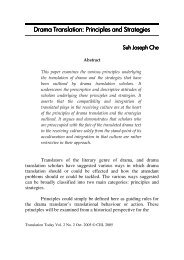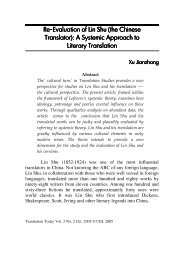not speaking a language that is mine - National Translation Mission
not speaking a language that is mine - National Translation Mission
not speaking a language that is mine - National Translation Mission
- No tags were found...
Create successful ePaper yourself
Turn your PDF publications into a flip-book with our unique Google optimized e-Paper software.
Not Speaking A Language That Is Mine 39Identities are always relational and accretive. When anIndian meets a European, he identifies himself as an Indian;when he meets a<strong>not</strong>her Indian, he specifies h<strong>is</strong> lingu<strong>is</strong>ticidentity; when he meets a<strong>not</strong>her member of h<strong>is</strong> lingu<strong>is</strong>ticgroup, he particularizes the region. Unlike <strong>that</strong> of other Indianlingu<strong>is</strong>tic groups, the d<strong>is</strong>placed Hindu Punjabi's particularizedplace <strong>is</strong> <strong>not</strong> relational and accretive but d<strong>is</strong>junctive. Recalling aregion-based memory preserved in the dialect <strong>that</strong> the nationalmemory erased forever along with the homeland, th<strong>is</strong>d<strong>is</strong>junctive small regional memory recalls the violence of thenational superscript. As the sole signifier of a particular ethnoculturalidentity, the loss of dialect <strong>is</strong> particularly poignant as agrim reminder of the permanence of the loss of the homeland.The d<strong>is</strong>placed Hindu Punjabi's subjectivity <strong>is</strong> barbwiredagainst real geographical space. Unlike the materiality ofregional spaces inhabited by other dialects, the geo-regionsurvives virtually as a memory. The d<strong>is</strong>placed Hindu Punjabi'ssmall regional memory reverses the rea1/imaginary dialectic ofthe region and the nation through th<strong>is</strong> act of double imagining.While the indelibility of vernaculars enables otherlingu<strong>is</strong>tic returns, speakers of van<strong>is</strong>hing dialects can d<strong>is</strong>rupt thehomogenous nation space only by writing difference in thenational <strong>language</strong>. The national <strong>language</strong> does <strong>not</strong> meetregional <strong>language</strong> difference but <strong>is</strong> repeated with a difference,a difference <strong>that</strong> does <strong>not</strong> return as the same. The repetition ofthe national <strong>language</strong> fractures its unified structure to inscribethe absence of the dialect. Neither Hindi nor Punjabi, the new<strong>language</strong> calls forth the violence of the idea of the nation. Likeits speakers, the hybrid idiom <strong>is</strong> articulated in the transitoryspace of d<strong>is</strong>placement. Neither at home in the new Hindi; nor
















